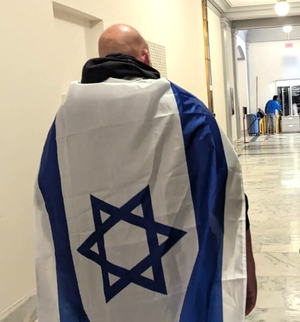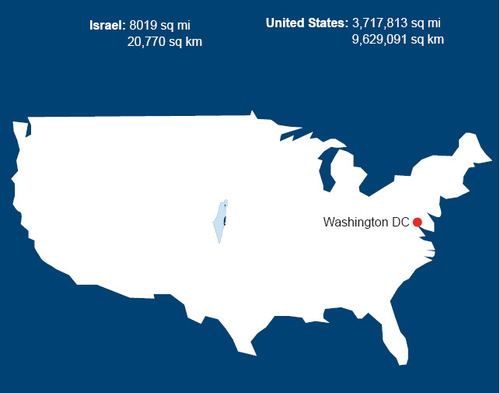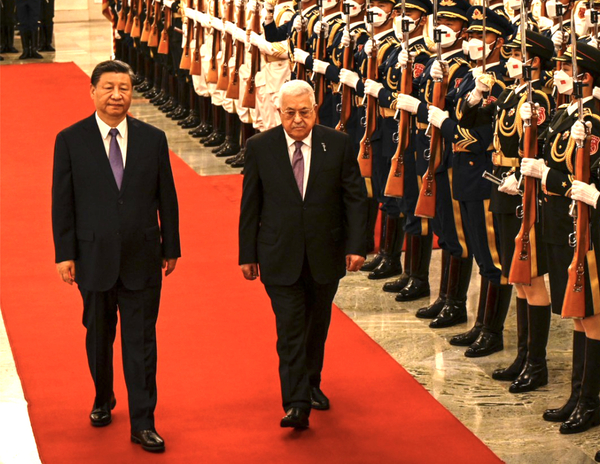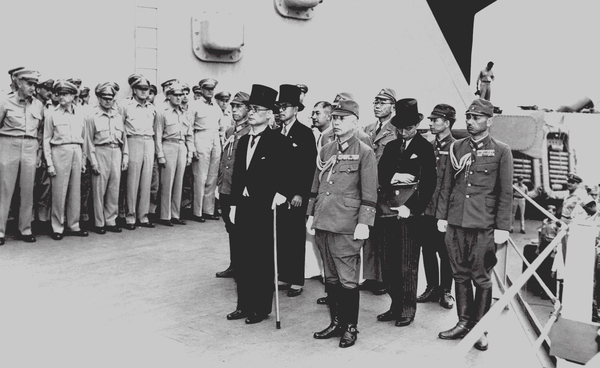It's a great pleasure to be back on the Middle East Forum podcast. I actually initiated the series almost four years ago in March 2020. It's my first time back as a solo speaker.
I've just finished a book on the Palestinian-Israeli conflict, so I watch what's happened since October 7 with a special interest. I'd like to take up five topics, which I find somewhat mystifying and will attempt to clarify. I'll go through four of them fairly quickly and dwell a bit on the final one.
First point: What is wrong with Israel's military, and more broadly, its security establishment? How could it let something like October 7 happen? Answer: the Zionist and then the Israeli security establishment – the military, the intelligence, law enforcement – have been in precipitous decline over the past half-century. The Zionists were very clever and very accomplished when they had few means, and the Israelis won an extraordinary war of independence in 1948-49, then what was probably the most lopsided victory in modern history in 1967.
 The famous photograph of Israeli paratroopers standing next to the Western Wall after capturing eastern Jerusalem. (credit: David Rubinger) |
From then on, which is now over half a century, they have declined. Famously, in 1973, they failed to see what was coming from Syria and Egypt. Further terrible problems followed. In 1993, the Oslo Accords made no sense at all; bring in your most violent and vehement enemy to be your nearly sovereign neighbor? In 2005, leave Gaza and allow your enemy to take over there? The Israeli security establishment is not what it used to be. And so, 2023 comes not as such a great shock after 1973, 1993, 2005. That establishment needs a real kick, such as it just got, to recognize its deep problems.
Second, while the Israelis responded to October 7 with a great deal of talk about victory, which was music to my ears, they quickly reverted to a non-victory approach. One sees that over the last three months, with its reversion. For example, even though the Gazan workers are now in retrospect understood to have been spies, Israelis immediately allowed in some 6,000 West Bank workers – who presumably could be spies as well. The Israeli government decided to send monies to the Palestinian Authority. It appeased Qatar as an intermediary. It supplied Gaza with fuel and water. It ignored the threat of West Bank buildings. There's talk of allowing the Hamas leadership to flee Gaza and set up somewhere else, perhaps in Qatar or Turkey. There has been a surge in electoral support not for those who are intent on ending Hamas's presence, but for those who are more moderate and less intent on victory.
So, I don't see fundamental change. As in the United States after 9/11 when "everything changed," so one heard in Israel after October 7. But I don't think everything changed.
 Sen. John Fetterman (Democrat of Pennsylvania) in the halls of a Senate office building. |
But then, over time, sympathy for Israel has eroded and that for Hamas has increased. There's been a deep unease with Israel doing roughly what the United States and its allies did against ISIS – going in and taking out the enemy. The Israelis are losing support all the time.
Fourth point: Hamas has a unique logic. I don't know of any historical example comparable to it. Hamas seeks death and destruction. It doesn't seek to win on the battlefield but to lose. It seeks for the people that it governs to be harmed, to be bombed, to be homeless, to be hungry, to be dead. It is using Gazans as cannon fodder, but not the usual kind of cannon fodder that goes and attacks the enemy. This is cannon fodder that suffers.
You can see how different Hamas is from Hezbollah in Lebanon or the Palestinian Authority on the West Bank, both of whom are far more conventional. They assess, they look, they make trouble, they play games, they don't want to get smashed. Hezbollah in 2006 killed three Israelis and captured two more; that led to all-out war. Right after that war, the head of Hezbollah, Hassan Nasrallah said, "If there was even a 1 percent chance that the July 11 capturing operation would have led to a war like the one that happened, would [I] have done it? I would say no, absolutely not."
He thought that there was an understanding that you keep things simmering, which is in fact the case right now. There's a simmering between Hezbollah and Israel. Hezbollah is careful not to provoke, careful not to get F-35s screeching over Lebanon and bombing targets. Hamas is not careful. Hamas wants death and destruction.
The West Bank under the Palestinian Authority is much more careful than Hamas. Mahmoud Abbas plays games. He works with the Israelis here, he murders them there, but he's careful. He doesn't want to be bombed. He doesn't want to be overthrown. He doesn't want to be hammered the way that Hamas does.
Hamas is unique in this logic of losing in order to get sympathy from its allies, in particular the Islamists around the world and the left in general, the hard left in particular. And it works to a certain extent. As I just mentioned, support for Israel has eroded over the last three months.
My final point is to try and understand the allies of Hamas. They have engaged in a campaign that is hard to understand. It's extremely aggressive. It looks counterproductive. For example, the pro-Hamas elements in the United States disrupted parades, the Thanksgiving Day parade in New York City, the Rose Bowl Parade in Pasadena. They disrupted traffic, major ways to such airports as LAX and JFK. They blocked Manhattan one early Monday morning, blocking bridges and a tunnel, creating havoc. They attacked Christian ceremonies, including a Christmas carol event to raise money for the blind in Melbourne, Australia and a Christmas party for Democratic operatives in Detroit. . They have attacked the U.S. military. They make trouble for Air Force bases. They serenaded Lloyd Austin, the US secretary of defense, with horrible ditties outside his home on Christmas morning. They made themselves obnoxious.
 Friends of Hamas disrupted traffic on the Van Wyck Expressway leading to Kennedy International Airport. |
On another level, the Houthis are doing the same in the Red Sea, making themselves obnoxious. They have little to gain by interrupting global commerce. They gain nothing by having ships go around the Horn of Africa rather than through the Suez Canal. It seems gratuitous. Also, the Iran-backed militias in Syria and Iraq have attacked American forces over a hundred times in the hundred days since October 7, more than once a day.
So, between these antics in the West and these lethal attacks in the Middle East, what's going on? Are these hostile actions self-indulgent or part of some clever strategy?
The allies of Hamas clearly are not trying to win new friends. Rather, they are imitating the Hamas tactic of martyrdom to win support among Islamists and leftists. Whereas jihadis typically want battlefield victories, Hamas knowingly begins wars against a more powerful enemy, wanting to be defeated and claiming victim status. Destruction and death enhance its draw. It gains politically by doing badly militarily.
In this spirit, Western and Middle Eastern groups also aspire to win sympathy and support by becoming martyrs. Christmas parties, football game parades, New York City traffic, and the White House: they push the police to arrest and maybe beat up the protestors. Attacks on global shipping and the attacks on US forces provoke a US response.
Therefore, massacring Israelis, disrupting world trade, and inconveniencing American motorists are not the primary goal, but a means to bait Israeli and American militaries and win new support for Hamas and its supporters. However, this risks everything. The October 7 massacre jeopardizes the existence of Hamas and the other organizations take similar chances.
Questions and Answers
Q: Is the two-state solution essentially dead? Was it always a Western fantasy?
A: I don't think it is dead. Yes, it's a fantasy now, given that the PA and every other Palestinian group seeks the destruction of Israel. But one day, if there is an Israel Victory and a Palestinian defeat, if the Palestinians give up on their rejectionist goals, yes, there can be two states. So, it's not possible anytime soon, but it's conceivable as an abstract possibility.
Q: Are the Israeli objectives for the Hamas War realistic in light of world politics and the entrenched Hamas ideology in Gaza?
A: We all called for the destruction, elimination of Hamas, me included, at the very beginning. And now, a hundred days on, it's a little murky as to what exactly this means. I think what it means is (1) the ending of Hamas control in Gaza, and (2) the reduction or perhaps even elimination of its funding by states. Its ideas will continue, but the organization need not. So, no, I don't think it's unrealistic. It is realistic, and the Israelis are determined. Prime Minister Netanyahu gave a talk just two days ago in which he said, "We are on the path to victory and we will not stop until we achieve victory." They seem determined. Good for them.
Q: Given the geopolitics, can Israel really extract itself from the vassalage to the US?
A: Vassalage is a strong term. The US is a great power, the great power. Israel is a small country: 330 million versus 10 million. Israel cannot build its own fighter aircraft, its own naval vessels, and so forth. Israel needs allies, and in particular, the United States, but there is horse trading going on. Israelis can bargain not just for money, but also, for leverage. Israelis have alternatives that they can turn to. United States needs Israel. It's not just Israel that needs the United States. The Middle East is at the center of the world. It's extremely volatile. There is no other country in the region that shares our values and with which we have a strategic alliance. Turkey was once that way, but not for the past 20 years. So, Israel stands alone in the Middle East. I don't see vassalage. These are tensions inherent in an alliance between a great power and a small power.
 Just the continental United States is slightly larger than Israel. |
Q: What will it take for the US to demand a surrender by Hamas as opposed to a ceasefire?
A: The United States has become an active military ally of Israel, without saying so. The United States has, within the last few days, killed a number of Houthis and attacked a number of Houthi installations in Yemen. This was not portrayed as something helpful to Israel, but rather for freedom of navigation. But, in fact, the United States and Israel are on the same side and their alliance has deepened. Also, in October, a US ship shot down missiles going from Yemen to Israel, something that had not happened before. So, things are changing, and while there's a reluctance on both sides, Israeli and American, to note what I've just said, the new reality exists.
Q: You mentioned the Establishment versus Islamist and leftist support for Hamas. Can the Establishment stay strong with Israel or will it cave to Islamist and leftist pressure?
A: There are three groups, basically. The anti-Israel cohort (by the way, I don't use the word pro-Palestinian; they're not in the least pro-Palestinian; they're anti-Israel) which is primarily Islamist and leftist; Jeremy Corbyn, for example, joined the South African effort against Israel at the International Court of Justice (ICJ). Then you have those who strongly support Israel, unwavering in their support. Finally, you have those in the middle who feel pressured. Joe Biden is a perfect example. His instinct is friendly to Israel, but there are plenty in the Democratic Party who are hostile to Israel. So, he's trying to have it both ways, trying to please both sides. The diplomatic missions of Antony Blinken reflect the confusion of this position.
Where this middle group, which includes many Western governments, will land is unclear. But so far, it has basically stood by Israel, providing arms and, in effect, siding with Israel militarily. It has wavered. It no longer stands where it was three months ago, but it is still there. I think the record suggests that this middle group will waveringly stick with Israel.
Q: Given what we know now about the scope, extent, and sophistication of the underground city and tunnel systems in Gaza, how could this have been developed without the knowledge of the Israeli intelligence?
A: The Israelis knew about the tunnels, which they called the Metro. What they didn't know was Hamas being ready to attack as it did on October 7. They had a notion that Hamas was settling in and becoming more a governing authority while losing its revolutionary zeal. Hamas played along with that belief and encouraged it. The Israelis were blind to what they were seeing. They saw reality, as plenty of reports of Israelis in the military indicate, but the high command was blind to it. It was a conceptual problem, not an intelligence problem. It's akin to the conceptual problem the Israelis had in 1973 when they assumed Anwar Sadat would not attack until he had more advanced planes. They assumed this, so they did not see what was coming because of the concept, in Hebrew, conceptzia. They had a conceptzia then, they had a conceptzia now.
Q: The ICJ seems to be anti-Israel in principle. How should Israel respond, regardless of any decision by the ICJ?
A: The Israelis are doing the right thing, which is to go and have their case presented by someone with a good international reputation. They might well lose, but I don't know how consequential that is. Again, there are three parties: those who support Israel, those who oppose Israel, and those in the middle who are not quite sure. All the attention is focused on the last party. Will it be influenced by the ICJ? Will it be influenced by the media coverage? As time goes on, that tranche between the pro and anti-Israel factions gets smaller. More people, especially in the last three months, have picked sides and know what they think. My opinion, for example, will not be changed by the ICJ's verdict, and neither will yours, probably. The number of people whose views will be affected by the ICJ verdict is probably not that great.
Q: If the ICJ rules against Israel, isn't it possible that any and all officials, ministers, even the PM, could be arrested while traveling abroad?
A: I'm not one to tell you about the legal fine points, but an ICJ verdict against Israel could complicate Israeli lives in countries that accept that verdict. Presumably, Israelis know which countries those are and, probably, those are countries that they wouldn't want to go to anyway.
Q: Where is China in all of this?
A: China's had a pretty good relationship with Israel for decades now, but that has seriously gone south. TikTok, the Chinese social media, is vehemently antisemitic and the Chinese government is siding ever more with anti-Israel forces, Iran in particular. China is coming out of the neutral zone into the hostile. It makes perfect sense: the United States is close to Israel, so China doesn't like Israel.
 The PA's Mahmoud Abbas got the honor-guard treatment on visiting XI Jinping in June 2023. |
Q: How does Israel bring the kidnapped persons home alive?
A: I would de-emphasize the hostages and not make them a major focus of public attention, but rather focus on victory. The way to get them back alive is certainly not through yellow ribbons and photographs of the missing; that amounts to an enormous mistake. Smart is to push the whole topic aside, saying to the hostage families, "Your loved ones are very much on our mind. We're doing everything we can. We're not doing so by negotiating with Qatar and Hamas. We're doing so by winning."
Q: Where do you see the Israel-Hezbollah face-off going?
A: As I mentioned earlier, Hezbollah plays the game, knows the rules of the game, as does Israel. In 2006, Israelis broke the rules of the game but they're not likely to do so now, being focused on Gaza. Hezbollah does not want to be smashed, it sees that the Israelis are angry, so I expect the low-grade hostilities of the last three months will likely continue. I would be surprised if it flares into all-out war such as was in 2006 or now in Gaza.
Q: What does it take to allow Israelis in the north of the country to return home?
A: This is a big problem, for Hezbollah's hostilities have disrupted their lives and caused hundreds of thousands of Israelis to have to move away from the northern border with Lebanon. The Israelis need to reach one of those implicit agreements with Hezbollah. They do that by making it clear to Hezbollah that the current situation is unacceptable, that it cannot go on. Hezbollah would recognize that it can't keep so many Israelis from their homes indefinitely. But the Israelis have a full plate, and they focus more on Gaza than on Lebanon, so that has not happened yet.
Q: Any idea who will govern Gaza after Israel's victory?
A: I don't know who will. I know who I want to. Plenty of Gazans despise Hamas and being used as cannon fodder by it. They want normal lives – by which I mean lives comparable to those in Egypt or Jordan, where they're not particularly friendly to Israel, but they live side by side with Israel without making trouble. I think there is a cohort of Gazans who will work with Israel to set up an administration, a police force, and govern the entity as a quasi-governmental agency. I very much hope the Israelis go in that direction and that the US government doesn't get in their way. This is best for Gaza, best for Israel.
Q: What will total Israeli defeat of Hamas ultimately look like? Will there be a sit-down and a signing of a surrender document, à la Japan or Germany in World War II, or will there be no Hamasniks left to surrender, and the surrender will be assumed?
A: There has been no surrender ceremony since 1945, best I know, nor will there be one now. But there will be a collapse of Hamas authority and Hamas's ability to reach into Gaza and provoke hostilities against Israel. That will constitute victory for Israel.
 The last surrender ceremony? Japanese delegates aboard the USS Missouri on Sep. 2, 1945. |
Q: Given that Hamas does not seek victory in Gaza, how will Israel determine its end point in the war?
A: Hamas does seek victory, but not on the battlefield. It seeks victory by finding support around the world. Israel needs to eliminate Hamas from holding any kind of power in Gaza.
Q: How much is the conflict with Hamas a matter of addressing a symptom and not the virus – i.e. Iran?
A: Iran is the head of the Hydra, and it is behind the attacks in Iraq, Syria, Lebanon, Gaza, Yemen. Who knows where they'll go next? [DP addition: Shortly after this discussion, the Iranians attacked Pakistan.] The Iranian regime has to be addressed, and in particular, its nuclear infrastructure. The US government shows concern but has made it clear it's not going to do anything. Who knows? That could be a feint, but at this point, there's no reason to disbelieve it. Iran is the ultimate source of many Middle Eastern problems, but the US government has never since 1979 made it a goal to overthrow the Islamic Republic. We've never helped dissidents do anything, particularly in 2009. A year and more ago we didn't respond to the Mahsa Amini demonstrations across Iran. It's time to confront the real source of most Middle East problems, namely Tehran.
Q: Has there been any consequences for the journalists accompanying Hamas's murderous rampage?
A: They've been noted and pointed out, but I don't know that they've been fired, much less penalized.
Q: Meanwhile, the slaughter in Russia, Ukraine continues with no outcry about the innocent civilians being killed. Why the different approach? Why, when Israel acts, is there such intense scrutiny?
A: Not just Ukraine, but are you aware of the 10/27, not 10/7 but 10/27, insurgency that took place in Myanmar, in Burma? It represents a major effort by insurgents to overthrow the horrible military government there, but you have to look hard to find any news coming out of it, much less Sudan, or eastern Congo, or other much larger conflict zones. When Westerners fight non-Westerners – Americans in Iraq or French in West Africa – it's news, and all the more so when it's Jewish Westerners. That gets a lot more attention than when it's non-Westerners fighting non-Westerners.
Q: What about Russia? Which side is it on?
 Unexpected collateral damage of the Hamas-Israel War: Claudine Gay's presidency of Harvard University. |
Q: Is there any chance for escalation of the Israel-Hamas war? Is there any indication that this could spread to Iran, and the US, and world powers getting involved in this?
A: It already has. Consider: Yemen, the United States, Britain. It could spread to Lebanon. I don't think the Syrian government seeks trouble with Israel, but it could spread in other ways. Reports suggest that Iranian insurgents and conspiracies are on the march in Jordan. There are many more implications than I would have imagined three months ago. In particular, the Houthi disruption of world trade has potential for all sorts of trouble. What if they do blow up an oil tanker?